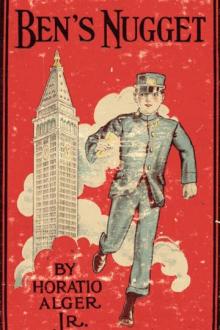Andy Grant's Pluck, Jr. Horatio Alger [kiss me liar novel english .TXT] 📗

- Author: Jr. Horatio Alger
Book online «Andy Grant's Pluck, Jr. Horatio Alger [kiss me liar novel english .TXT] 📗». Author Jr. Horatio Alger
"Can you leave the children?"
"I will ask my neighbor, Mrs. Parker, to look after them. What a good young man you are!" she exclaimed, gratefully.
"Not young man—boy," corrected Andy, with a smile.
"Won't you stay and take a cup of tea?"
"Thank you, Mrs. Carter, but I have an evening engagement. Oh, by the way, I forgot to say that Mr. Gardner will pay you ten dollars a week."
"I shall feel rich. I shall no longer be worried by thoughts of starvation."
"Some time you might consult Mr. Gardner about your brother-in-law's withholding your share of the estate. He will be able to advise you."
Andy felt a warm glow in his heart at the thought of the happiness he had been instrumental in bringing to the poor family. He had learned the great lesson that some never learn, that there is nothing so satisfactory as helping others. We should have a much better world if that was generally understood.
The next day Andy received a letter from his stanch friend, Valentine Burns. He read it eagerly, for it brought him some home news, and in spite of his success he had not forgotten Arden and his many friends there.
This was the letter:
"DEAR ANDY: How long it seems since I saw you! You know that you were my most intimate friend, and of course I miss you very much. To be sure, there is Conrad, who seems willing to bestow his company upon me, as my father happens to be pretty well off, but I look upon Conrad as a snob, and don't care much about him. When we met yesterday, he inquired after you. "'What's your friend, Andy Grant, doing in the city?' "'He is in a real estate office,' I replied. "'Humph! how much does he get paid?' "'Five dollars.' "'That is probably more than he earns, but it isn't much to live upon.' "I didn't care to tell him that you had another income, but said: 'Don't you think you could live on it?' "'I couldn't live on ten dollars a week,' said Conrad, loftily. 'But, then, I haven't been accustomed to live like Andy Grant.' "It must be pleasant to you to know that Conrad feels so much interest in your welfare. "Sometimes I see your father. He looks careworn. I suppose he is thinking of the difficult position in which he is placed. I am sorry to say that last week he lost his best cow by some disease. I heard that he valued it at fifty dollars. I hope that you won't let this worry you. The tide will turn some time. I saw your mother day before yesterday. She is glad of your success, but of course she misses you. She always receives me very cordially, knowing that we are intimate friends. "I wish I could see you, Andy. You have no idea how I miss you. I like quite a number of the boys, but none is so near to me as you were. "Well, Andy, I must close. Come to Arden soon, if you can. It will do us good to see you, and I think even Conrad will be glad, as it will give him a chance to pump you as to your position. "Your affectionate friend, "VALENTINE BURNS.""So father has lost his best cow—old Whitey," said Andy, thoughtfully. "If I were not owing money to Mr. Crawford for the land in Tacoma I would buy him a new one, but some time I hope the land will be valuable, and then I can make the loss good to father."
The reader has not, I hope, forgotten Andy's fellow lodger, S. Byron Warren. Mr. Warren was always writing something for the Century, the Atlantic, or some other leading magazine, but never had been cheered by an acceptance. The magazine editors seemed leagued against him.
But one evening, when Andy returned from the office, he found Mr. Warren beaming with complacence.
"You look happy to-night, Mr. Warren," he said.
"Yes," answered the author; "look at that."
He held out to Andy an eight-page paper called The Weekly Magnet, and pointed out a story of two columns on the second page. Under the title Andy read, "By S. Byron Warren." It was called "The Magician's Spell; A Tale of Sunny Spain."
"I congratulate you," said Andy. "When did you write the story?"
"Last winter."
"How does it happen to be published so late?"
"You see, I sent it first to Scribner's, then to Harper's, and then to the Atlantic. They didn't seem to fancy it, so I sent it to the Magnet."
"I hope they paid you for it."
"Yes," answered Warren, proudly. "They gave me a dollar and a half for it."
"Isn't that rather small?"
"Well, it is small, but the paper is poor. The editor wrote to me that he would be glad to pay me ten dollars for such a sketch when they are more prosperous."
"I suppose you will write again? You must feel greatly encouraged."
"I have been writing another story to-day. I shall mail it to them to-morrow."
"I hope the Magnet will prosper for your sake."
"Thank you. I hope so, too. Ah, Andy, you don't know how it seems to see your own words in print!" said the author.
"I am afraid I never shall, Mr. Warren. I was not intended for an author."
"Oh, I think you might write something," said Warren, patronizingly.
"No; I shall leave the literary field to you."
CHAPTER XXVII. — ANDY MAKES A COMMISSION.
Mr. Crawford was busy in his office when a gentleman of fifty entered.
"I hope you are at leisure, Crawford," he said.
"But I am not, Mr. Grayling. I am unusually busy."
"I wanted you to go out and show me that house in Mount Vernon which you mentioned to me the other day. My wife is desirous of moving from the city for the sake of the children."
"Won't to-morrow do?"
"To-morrow I shall be busy myself. To-day is so fine that I managed to get off. Can't you manage to go?"
"No, Grayling, I can't possibly be spared from the office."
"Is there no one you can send with me?"
Mr. Crawford hesitated a moment. Then, as his eye fell upon Andy, he had a sudden thought.
"I will send this young man," he said.
Mr. Grayling smiled.
"He seems quite a young man," he said.
"Yes," said Mr. Crawford, with an answering smile,





Comments (0)